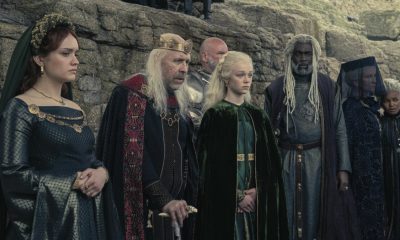Entertainment
‘Foe’ review: Saoirse Ronan and Paul Mescal can’t save this empty sci-fi mess

By all appearances, Foe is a beautiful movie. Beautiful people — Saoirse Ronan, Paul Mescal, and Aaron Pierre — explore beautiful landscapes, talking about beautiful human emotions like love and loss.
Yet all these aesthetic pleasures can’t cover up the vapid emptiness at Foe‘s core. There is indeed some attempt at substance here, but it’s buried under layers of nonsensical storytelling and clumsy dialogue. Not even its prestigious stars can sell it.
What’s Foe about?

Saoirse Ronan in “Foe.”
Credit: Amazon Studios
Ronan and Mescal play Hen and Junior, a married couple living through the climate crisis. The year is 2065, and water and habitable land are scarce. Humans have begun moving to space stations to preserve the species, but Hen and Junior remain on Earth, living in Junior’s family’s old farmhouse in the Midwest.
Director Garth Davis, who co-wrote Foe‘s screenplay with the original novel’s author Iain Reid, finds beauty in the apocalyptic. Gorgeous desert landscapes and pink salt flats make up Hen and Junior’s isolated world, while billowing clouds of smoke in the distance suggest encroaching danger. These quiet vistas are about as subtle as Foe gets — emphasis on quiet, because it’s when the movie really gets talking that it starts to lose you.
That talking begins in earnest with the arrival of mysterious stranger Terrance (Pierre) on Hen and Junior’s farmstead. Terrance reveals that Junior has been chosen to live on a space station for a few years. However, Hen will have to stay behind while he’s gone.
To make sure that Hen isn’t totally alone while Junior is in space, Terrance’s company OuterMore will provide her with an AI human substitute of Junior — essentially a clone. In order to get this substitute completely right, Terrance will live at home with Hen and Junior, observing every aspect of their marriage and conducting interviews about their personal lives. If this all seems like a lot of trouble to go to to send one man into space, you’d be right! Why not set up correspondence between the space station and Earth? Or why not send Junior’s replacement into space, if he’ll basically be the same person?
These are all questions Foe simply avoids in order to get to the meat of the film: Terrance’s time with Junior and Hen. Unfortunately, this meat has all the flavor and value of a scrap of gristle.
Foe is a run-of-the-mill marriage drama with uninspired sci-fi elements.

Saoirse Ronan and Paul Mescal in “Foe.”
Credit: Amazon Studios
Despite being the focus of the film, the actual discussions of Hen and Junior’s marriage are not particularly revelatory. Junior is possessive of Hen and (not so shockingly) grows jealous of Terrance’s talks with her. Meanwhile, Hen feels that the marriage is stifling. As time goes on, she confides in Terrance that their marriage has become predictable, complete with a sense of losing her identity. “It’s like he’s replaced me with someone else,” she tells Terrance.
The sublimation of self to keep a dying marriage going is not necessarily a new idea, although here, Foe complicates it somewhat with the addition of AI replacements. When Junior leaves for space, he’ll have given up everything of himself in order to create a copy that can stay behind. But instead of reckoning with that further, or with the fact that he will be going to space, we mostly see Junior mope about how his wife will be spending time with another man — even though it will look and act exactly like him. Who needs nuance when we could watch the archetypes of the jealous husband and the cowed wife instead?
For their parts, Ronan, Mescal, and Pierre do their greatest with the material they’re given. Mescal channels frustrated male aggression — culminating in a wall-punching scene, no less! — but he tries to soften it with bewilderment as Terrance’s lines of questioning become more and more bizarre. Pierre is softly menacing as an authority figure who has the clear power over Hen and Junior. Foe mostly relegates Ronan to the role of subdued wife, which is a travesty given her skill. (It’s also, ironically, what Junior does to Hen.) Despite her character being a mostly unknowable mystery, Ronan delivers a layered performance that ages better as Foe arrives at its climax. Still, even she can’t make lines like “It would mean nothing and everything at the same time” feel human.
With the set-up of three great actors mostly confined to a house in the middle of nowhere, you may expect Foe to be an artful pressure cooker. Yet Foe is almost entirely devoid of tension, playing more like a series of overwrought vignettes that neither build on each other nor reach meaningful conclusions. The conclusion the film does reach is as self-satisfied as it is predictable, with all the subtlety of a slap to the face.
The casting of Academy Award nominees Ronan and Mescal suggests that Foe is aiming for prestige, but in reality, it calls to mind another sci-fi disappointment: 2016’s Passengers. While Passengers is more of a blockbuster and Foe is more contained, both films highlight their leading pair of beloved stars — Ronan and Mescal in Foe‘s case, Jennifer Lawrence and Chris Pratt in Passengers‘. Both also fail to deliver on their stories of romantic relationships tested by humans’ attempts to leave a dying Earth.
It’s hard to tell if Foe is a case of wasted potential, or if its concept — with its uninspiring ideas and groan-worthy twists — was doomed to fail from the start. Ultimately, its visual beauty is the greatest thing about it. And that is certainly not enough to make up for hollow filmmaking.
How to watch: Foe is now streaming on Prime Video.
UPDATE: Oct. 5, 2023, 2:07 p.m. EDT Foe was reviewed out of the 2023 New York Film Festival. This review has been rerun for its streaming release.
-

 Business7 days ago
Business7 days agoAI chip startup DEEPX secures $80M Series C at a $529M valuation
-

 Entertainment6 days ago
Entertainment6 days agoJinkx Monsoon promises ‘the queerest season of ‘Doctor Who’ you’ve ever seen!’
-

 Business6 days ago
Business6 days agoStrictlyVC London welcomes Phoenix Court and WEX
-

 Entertainment6 days ago
Entertainment6 days agoHow to watch every ‘Law and Order’ online in 2024
-

 Entertainment6 days ago
Entertainment6 days agoBookTok and teens: What parents need to know
-

 Business5 days ago
Business5 days agoWhy Apple’s ‘Crush’ ad is so misguided
-

 Business4 days ago
Business4 days agoWomen in AI: Rep. Dar’shun Kendrick wants to pass more AI legislation
-

 Entertainment7 days ago
Entertainment7 days ago'House of the Dragon' recap: Every death, ranked by gruesomeness




























